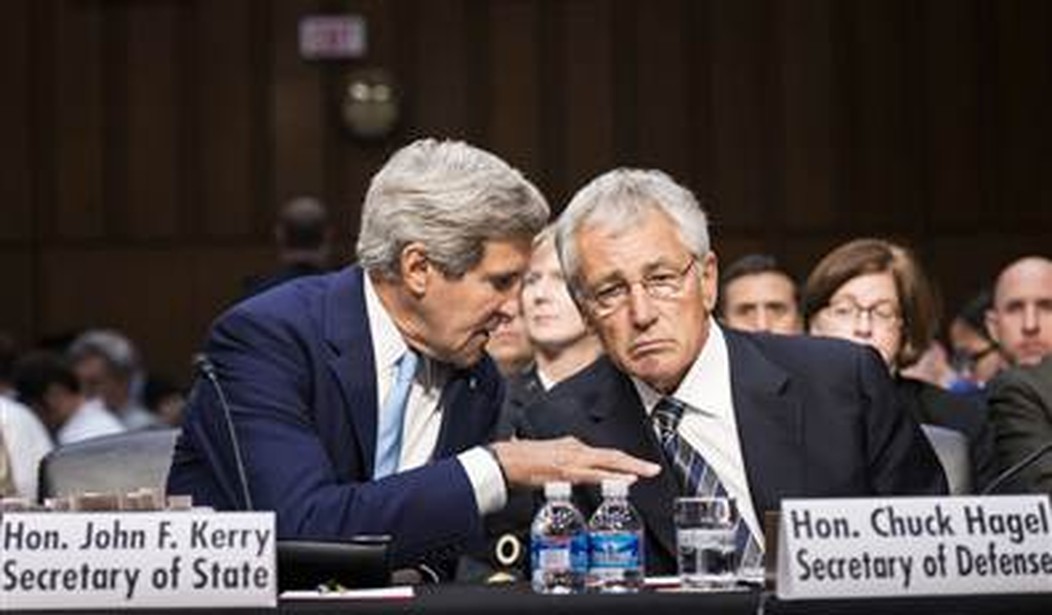WASHINGTON — Facing a committee whose members’ skepticism wasn’t easily distinguished by party lines, Secretary of State John Kerry led the administration’s charge for action in Syria in the first open hearing before the congressional committee he used to lead.
Though Congress still isn’t back in session, the Senate Foreign Relations Committee returned for a nearly four-hour hearing today that also featured Defense Secretary Chuck Hagel and Chairman of the Joint Chiefs of Staff Gen. Martin Dempsey as witnesses.
Kerry, with his wife Teresa Heinz Kerry and a sprinkling of antiwar protesters in the audience, reiterated his assertion that the evidence pointing to Bashar al-Assad’s guilt in gassing his own people is irrefutable.
“My colleagues, we know what happened. For all the lawyers, for all the former prosecutors, for all those who have sat on a jury, I can tell you that we know these things beyond a reasonable doubt that is the standard by which we send people to jail for the rest of their lives,” he said.
“Now, some have tried to suggest that the debate we’re having today is about President Obama’s red line. I could not more forcefully state that is just plain and simply wrong. This debate is about the world’s red line. It’s about humanity’s red line. And it’s a red line that anyone with a conscience ought to draw.”
It’s also, Kerry added, about “Congress’ own red line.”
“I will tell you there are some people hoping that the United States Congress doesn’t vote for this very limited request the president has put before you. Iran is hoping you look the other way. Our inaction would surely give them a permission slip for them to at least misinterpret our intention, if not to put it to the test. Hezbollah is hoping that isolationism will prevail. North Korea is hoping that ambivalence carries the day. They are all listening for our silence,” he said.
Israel, Jordan and Turkey, Kerry continued, “are one stiff breeze away from the potential of being hurt, of their civilians being killed as a consequences of choices Assad might take in the absence of action.”
“We need to send to Syria and to the world, to dictators and to terrorists, to allies and to civilians alike the unmistakable message that when the United States of America and the world say, never again, we do not mean sometimes. We do not mean the somewhere. Never means never,” he said. “So this is a vote for accountability. Norms and laws that keep the civilized world civil mean nothing if they’re not enforced.”
While Kerry stressed “President Obama is not asking America to go to war,” Hagel said, “We are not unaware of the costs and ravages of war, but we also understand that America must protect its people and its national interests.”
And Kerry got nostalgic about his own military — or, most specifically, post-military — life after Code Pink’s Medea Benjamin staged the first antiwar outburst of the hearing.
“We don’t want another war. Nobody wants this war,” Benjamin shouted as Chairman Robert Menendez (D-N.J.) banged the gavel and Capitol Police led her out of the room. “Cruise missiles — launching cruise missiles means another war. The American people do not want this.”
“You know, the first time I testified before this committee — when I was 27 years old — I had feelings very similar to that protester,” Kerry said. “And I would just say that is exactly why it is so important that we are all here having this debate, talking about these things before the country, and that the Congress itself will act representing the American people.”
Menendez said he was at a soccer tournament over the weekend when a group of moms came up and said, “Senator, we saw those pictures. They’re horrific. We can’t imagine the devastation those parents must feel about their children. But why us? Why us?”
“And so, I ask you, would you tell them that we would be more secure or less secure by the actions that are being considered, for which the president has asked for the authorization of the use of force?” he asked the panel.
“Senator, I would say unequivocally that the president’s actions will make us more secure, less likely that Assad can use his weapons or chooses to use his weapons. And the absence of taking the action the president has asked for will, in fact, be far more threatening and dangerous and potentially ultimately cost lives,” Kerry said.
Sen. Barbara Boxer (D-Calif.), after a drawn-out monologue about times she did (Serbia) and didn’t (Iraq) cast votes in approval of force, asked if all intelligence agencies who reviewed the Syria evidence arrived at the same conclusion.
“To my knowledge, I have no knowledge of any agency that was a dissenter or anybody who had, you know, an alternative theory,” Kerry replied. “And I do know — I think it’s safe to say — that they had a whole team that ran a scenario to try to test their theory to see if there was any possibility they could come up with an alternative view as to who might have done it, and the answer is they could not.”
Sen. Marco Rubio (R-Fla.) drew praise from Syrians on Twitter for his criticism of an administration leading from behind.
“The choice was made to watch as this thing unfolded. Others advocated that we should just mind our own business. And what we’re seeing here now is proof and an example of when America ignores these problems, these problems don’t ignore us. We can ignore them, but eventually they grow and they come to visit us at our doorstep,” Rubio said.
The senator called out Kerry on noting “that one of the calculations that Assad used in deciding to use chemical weapons was that the U.S. wouldn’t do anything about it.”
“And I understand perhaps why he made that calculation because, yes, this was a horrible incident where 1,000 people died. But before this incident, 100,000 people had died, including snipers that were used to pick off civilians, including women that were raped as part of a — they were going to these villages to carry this out, and nothing happened. So, of course, he reached that calculation,” Rubio continued. “…Can we structure an attack that tips that calculation, where he’ll basically decide that he would rather risk being overrun by rebels than risking a limited attack from the U.S. if he uses these chemical weapons?”
Dempsey warned Rubio “it may be even more insidious than that.”
“He’s reached a point where he now thinks of chemical weapons as just another weapon in his arsenal. And that’s the part that makes this so very dangerous,” the general said. “And I think that as I’ve provided advice on what targets may be appropriate, I certainly want to degrade his capabilities coming out of this. I want to come out of it stronger than we go into it.”
“I’m confident in the capabilities we can bring to bear to deter and degrade,” Dempsey added. “And it won’t surprise you to know that we will have not only an initial target set, but subsequent target sets should they become necessary.”
Kerry agreed with the assessment that pro-democracy Syrian rebels and jihadist groups hold control over distinct territory and have very different ideas of the country’s future.
“The fundamentals of Syria are secular, and I believe will stay that way,” he said. “…There are some worse than al-Nusra and they tend to be most of them in the northern area and the east.”
The strongest voices against intervention came from Sens. Tom Udall (D-N.M.), who argued against “saying once again the United States will be the world’s policeman,” and Rand Paul (R-Ky.), who questioned whether Obama would strike even without congressional authorization.
“The draft authorization of force proposed by the administration states that it would allow the president to use the armed forces — and I quote here, ‘As he determines to be necessary and appropriate in connection with the use of chemical weapons, or other weapons of mass destruction in the conflict with Syria,'” Udall said. “This is a very open-ended proposal with no specific limits on types of forces that would be used, with no limit on their duration.”
“By degrading [Assad], you make these extremist forces stronger, do you not?” the New Mexico Democrat asked.
“No, I don’t believe you do,” Kerry responded. “You actually make the opposition stronger. The opposition is getting stronger by the day now.”
Paul remarked “it’s not often that I get to compliment the president.”
“I can probably count the number of times maybe on one hand. But when I first heard that the president was going to come to Congress, boy, was I pleasantly surprised. I was proud that he was my president. I didn’t vote for him and I still am opposed to him quite a few times, but I was proud that he did this,” the Kentucky Republican said.
“And I was just about to stand on my feet and clap and give him a standing ovation, and then I heard, ‘Well, but if I lose the vote, I’ll probably go ahead and do the bombing anyway.’ And so it does concern me. I want to be proud of the president, but every time I’m just about there, then I get word that really he doesn’t mean it; that he’s going to sort of obey the Constitution if he wins.”
“I don’t know what the president’s decision is,” Kerry said. “But I will tell you this, it ought to make you proud because he still has the constitutional authority and he would be in keeping with the Constitution.”
“You’re probably going to win,” Paul conceded. “Just go ahead and say it’s real and let’s have a real debate in this country, and not a meaningless debate that in the end you lose and you say, ‘Oh, well, we had the authority anyway; we’re going to go ahead and go to war anyway.'”
“Senator, I assure you there’s nothing meaningless, and there is everything real about what is happening here,” said Kerry.
“Only if you adhere to what we vote on. Only if our vote makes a difference. Only if our vote is binding is it meaningful,” Paul shot back.
“And I will leave to the man who was elected to be president of the United States the responsibility for telling you what his decision is, if and when that moment came,” the secretary of State said. “But the president intends to win this vote and he’s not going to make prior announcements.”
Menendez told members of the committee that he and Ranking Member Bob Corker (R-Tenn.) are close to arriving at a resolution that could be voted on as early as tomorrow. The panel reconvenes for a classified hearing in the morning.
The New Jersey Democrat wrapped up with a public service announcement of sorts.
“I grew up in a tough neighborhood. And we had a bully in the neighborhood. And I was walking along the street one day and he just slapped me in the face, and I went away and told my mom and she said avoid him. Avoid him. Just avoid him,” Menendez said. “And a week later, I saw the bully again and I did all my best to avoid him. And this time, he punched me in the nose. And it was bloody. And I went back to her and said, ‘You know, Mom, I tried to avoid him.’ She said, just avoid him.”
“And it wasn’t until the third time, when we were by a construction site, that I got a piece of wood and whacked the bully and that was the end of it. I never got whacked again. It’s not quite this. But there is a lesson to be learned.”









Join the conversation as a VIP Member